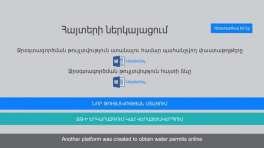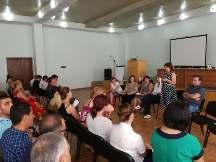
5 minute read
IV. RECOMMENDATIONS
Further Gaps and Needs
The USAID PURE Water project achieved the important milestones. It contributed to the behaviour change of stakeholders in the efficient management and use of groundwater resources in Ararat Valley. The project also had a sound contribution to the participatory and transparent water governance.
Advertisement
However, there are still gaps as well as needs for further improvement of transparent and participatory governance in groundwater resources in Ararat Valley. The gaps were revealed and the needs were raised by the project stakeholders (water users, local governments, water users associations, relevant decision-making authorities) responsible for water sector, by the project evaluation and by the project team during the implementation of the project:
A group of needs relates to completing some initiatives started within the PURE Water project and expanding/replicating some other accomplished activities (websites for other WUAs, linking websites to the Water Committee data server/GIS, making sure the water-use permitting portal is operational, assisting the NA Standing Committee to pass the laws on WUAs and Ecological Policy). Another need is connected with the landmark political change taken place in Armenia in April 2018. After the Velvet Revolution, an exceptional commitment to cooperation was demonstrated by Armenian authorities. The water sector is one of the priority reform areas for the new Government. As part of the reforms, it is on high political agenda with the aim to rethink and improve current irrigation water management to make it more efficient, transparent, accountable, and participatory. To make informed decisions in designing the reforms, the Government will need a comparative analysis of different models of irrigation water management, such as by Water User Associations, communities themselves and the private sector to come up with the most efficient and effective strategy for resolving that major issue. BMOs were not quite enthusiastic and motivated to provide input for and learn from the project. According to the project observations these were mainly because of the following reasons: - BMOs are underemployed to implement assigned responsibilities. Each of them has only 2-3 responsible staff for water basin covering dozens of communities and large geographic area. BMOs are still under the pretty strong control of MNP. The discussions of PURE Water with MNP indicated that the WRMA mostly directly implements some functions of BMOs because they lack resources and capacity. In fact, the functions prescribed by the Water Code for BMOs actually were not fully granted to them and their functions are limited to submissions to the WRMA of their observation on WUP applications and sending information about the situation. Communities within the BMOs service areas almost are not engaged in decision-making regarding water use permitting process and in basin management planning, in general. The baseline study showed no earlier participation by youth. The PURE Water project improved the situation. Young generation from target communities actively participated in the project activities. However, youth participation still remained low as compared with the age group from 45-75. COVID-19: some project activities have been delayed and/or redesigned because of pandemic.
IV. RECOMMENDATIONS
Ensure completion of the draft legal acts in water sector deriving from the Strategy and Road Map developed within the PURE Water project with a view of adoption by RA National Assembly - Law on Water Users Association by the RA National Assembly - Law on Ecological Policy - Law on Ecological Information Make amendments to RA Water Code and RA Government Decisions that regulate re-use and free use of water
Assess diversified management options for the irrigation water to ensure efficient and competitive irrigation management in Ararat Valley. Develop websites for 14 WUAs. Upgrade the GIS system of Water Committee to ensure transparent e-governance of irrigation water Reassess and improve the organizational management and operations of WUAs in a participatory manner by engaging water-users. Improve capacities of WUAs: - Organizational and institutional development (improved procurement, financial managements, rules and regulations, etc.). - Trainings to operate websites and GIS system. Make simplified online water-use permitting platform operational. The Government needs to further promote decentralization of water management, create conditions and provide resources for BMOs to fully implement their functions as prescribed by the Water Code. BMOs capacities need to be improved to implement efficient basin management in its service area. Promote civic engagement in the course of basin management process - starting from the development of basin management plans to the issuance of water use permits. The cooperation and coordination should be established between BMOs and communities located in its service area to ensure wider transparency and participation in basin management of the service area. Community activists, CBOs and CSOs, as well as development organizations need to make continuous efforts to entrench ownership and responsibility of citizens for the decisions taken in their communities through their direct participation. Continuous actions will mature over time civic activism and engagement and will turn them to habitual practices, behavior and culture. The Government needs to pursue in the future to continue the dialogue with fish farms in encouraging them to use water-saving technologies and discuss legislative changes related to the secondary/multiples water use. Environmental education should be continued in the schools by the state and CSOs. It is recommended to replicate the courses developed under this project to other schools. CSOs that have relevant experience, such as ATP, should be involved in this process to help redesign this course. Replicate innovative and cost effective monitoring and water-saving technologies piloted under the project (smart water meters for individual farmers land plots, saving and re-use of water from drinking fountains, trap for trash for irrigation canals, WUA website/portal. Ensure the sustainability of various successful interventions implemented within the framework of the Project: citizen scientists, citizen journalists, social audit, etc. Continue to implement drinking and irrigation water infrastructure projects in Ararat Valley by replicating water and energy saving technologies piloted under the project. Target local governments need to continue practicing management, oversight and feedback mechanisms provided under the PURE Water project: participatory budgeting, phone surveying, public hearings, problem identification methodology, etc. Community-based NGOs, water sector and environmental NGOs need to continue working with local community activists and together with them continue to voice and advocate water sector related problems using different tools mastered within the PURE Water project: town-halls, social audit, “citizen scientists”/idea contest, citizen journalists, etc. The Government needs to improve policies and regulations to ensure that predominant role of big fish-farms do not infringe the rights of small and medium fish-farms. Combine capacity building, behavior change-driven activities with material support: provision infrastructure and/or equipment. Such an approach will keep the partner communities committed in the course of implementation of the project. In the meantime, the activities aimed at capacity building and behavior change should be carried out continuously. Over time, it will become a habit and gradually, a culture. Still many communities in Ararat Valley remain water-stressed. The Government needs to continue to support water stress communities to improve their water infrastructure.






